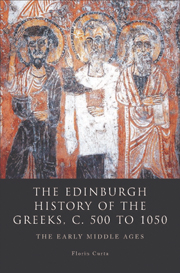Book contents
- Frontmatter
- Contents
- List of Illustrations
- List of Tables
- Acknowledgements
- Series Editor's Preface
- Introduction
- 1 The last century of Roman power (c. 500 to c. 620): army, church, and countryside
- 2 Collapse or adaptation? The problem of the urban decline in late antique Greece
- 3 Invasion or inflation? Hoards and barbarians in sixth- and early seventh-century Greece
- 4 Dark-Age Greece (c. 620 to c. 800)
- 5 Revival and expansion (c. 800 to c. 900)
- 6 The beginning of prosperity (c. 900 to c. 1050)
- 7 Early medieval Greece and the Middle Byzantine economy
- 8 Social structures and Byzantine administration in early medieval Greece
- 9 Christianity in early medieval Greece
- 10 Conclusion: the people of early medieval Greece
- Bibliography
- Index
Introduction
Published online by Cambridge University Press: 05 August 2013
- Frontmatter
- Contents
- List of Illustrations
- List of Tables
- Acknowledgements
- Series Editor's Preface
- Introduction
- 1 The last century of Roman power (c. 500 to c. 620): army, church, and countryside
- 2 Collapse or adaptation? The problem of the urban decline in late antique Greece
- 3 Invasion or inflation? Hoards and barbarians in sixth- and early seventh-century Greece
- 4 Dark-Age Greece (c. 620 to c. 800)
- 5 Revival and expansion (c. 800 to c. 900)
- 6 The beginning of prosperity (c. 900 to c. 1050)
- 7 Early medieval Greece and the Middle Byzantine economy
- 8 Social structures and Byzantine administration in early medieval Greece
- 9 Christianity in early medieval Greece
- 10 Conclusion: the people of early medieval Greece
- Bibliography
- Index
Summary
Few are the periods in the history of Greece for which continuity is a more sensitive issue than the early Middle Ages. For none is ethnic (as opposed to any other kind of) continuity more important for writing the history of Greece and the Greek nation. Discontinuity was first proposed by the German journalist Jakob Philipp Fallmerayer (1790–1861), who in the early nineteenth century claimed that modern Greeks were descendants not of ancient Greeks, but of Slavs and Albanians, whose ancestors had settled in Greece during the Middle Ages and had learned to speak Greek from the Byzantine authorities. Writing in the political climate created by the treaties of Adrianople (1829) and Constantinople (1832), which placed the newly created Greek state under the protection of the Great Powers, including Russia, and vouchsafed its independence from the Ottoman Empire, Fallmerayer was not as concerned with the Slavs per se as he was with what he viewed as the catastrophic consequences of their migra¬tion into Greece (Fallmerayer 1830, 1835, and 1845; see also Lauer 1993: 140). Driven both by the political liberalism of the Vormärz years and by apprehensions about Russia's increasing influence in the Balkans, Fallmerayer saw the proclamation of an independent Greek state as a weakening of the Ottoman Empire and a strengthening of Russia. He was therefore enraged by the political naivete of the European Philhellenes and attempted to prove that the Greeks and the Russians shared not only the same religion, but also the same ethnic origin (Fallmerayer 1830: iii-iv; see Thurnher 1995; Skopetea 1997: 99–132).
- Type
- Chapter
- Information
- The Edinburgh History of the Greeks, c. 500 to 1050The Early Middle Ages, pp. 1 - 12Publisher: Edinburgh University PressPrint publication year: 2011



